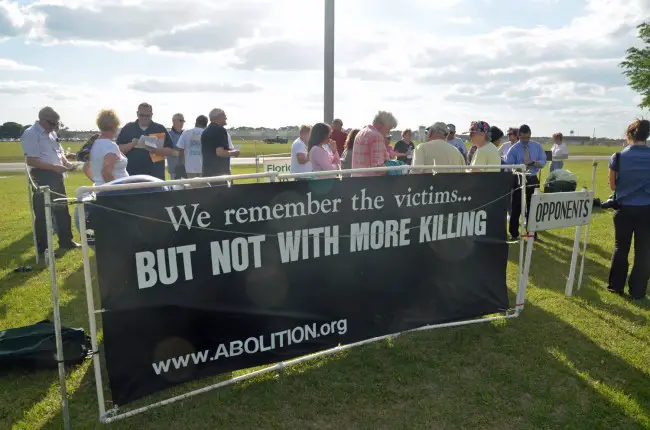Attorneys representing death row inmates want the Florida Supreme Court to block the controversial “Timely Justice Act” that is intended to reduce final delays in carrying out the death penalty.
In a challenge filed Wednesday, the attorneys contend that sections of the law signed June 14 by Gov. Rick Scott are unconstitutional. They allege, in part, that the law would violate the separation of powers by imposing obligations on lawyers that conflict with judicially-determined rules. They also say it would alter the court’s authority to govern capital post-conviction litigation and would violate due process and equal protection.
“It is clear that, when the Legislature restricts this court’s authority to reach final ruling on constitutional matters by creating a time-certain limit on capital litigation and rejects procedural vehicles recognized by this court as necessary components to ensuring the constitutionality of capital convictions and death sentences, it violates this court’s authority to be the ultimate interpreter of the Florida Constitution,” reads the emergency petition, first reported Wednesday by The Palm Beach Post.
“In an abrupt whirlwind of political maneuvering, the Florida
Legislature has passed an act which does away with much of [the Supreme] Court’s efforts to shape, and authority to govern, the means and method of capital postconviction litigation,” the petition argues.
Scott’s office has repeatedly contended that the law, which takes effect July 1, doesn’t “fast-track” the death penalty process and will not increase the risk of executing innocent people as some critics have argued. Instead, Scott’s office says the bill makes “technical amendments to current law and provides clarity and transparency to legal proceedings.”
Twenty-six death row inmates have been exonerated since the death penalty was re-instituted in the state in 1976, some of them after spending nearly two decades on death row.
The measure includes several changes in the death-penalty process. As an example, the act requires the clerk of the Florida Supreme Court to notify the governor when a death row inmate’s state and federal court appeals have been completed. The governor would then have 30 days to issue a death warrant if the executive clemency process has finished.
The warrant would require that the execution be carried out within 180 days. In the conclusion of the new challenge, the attorneys noted that during the House floor debate some legislators discussed that the law would likely result in additional delays “by creating constitutional deficiencies in the system, and that courts would have to issue stays to review the act’s functioning.”
The petition notes other comments by legislators previously reported. In April, for example, Republican Senator Rob Bradley said: “this is not about guilt or innocence, it’s about timely justice.” Another lawmaker, Matt Gaetz, the Republican who sponsored the bill in the House, said: “Only God can judge. But we sure can set up the meeting.”
The New York Times, called the measure “a grotesquely named bill” in an editorial in May, the same week when Clemente Javier Aguirre-Jarquin, an inmate on Florida’s death row, presented DNA evidence that could exonerate him of a murder conviction in a 2004 case.
“Tragically Mr. Aguirre’s lawyer never requested the DNA testing that could have proven that he was innocent as he always maintained,” said Nina Morrison, a senior staff attorney with the Innocence Project. “But new DNA testing on multiple pieces of evidence now confirms that Mr. Aguirre was telling the truth all along, and he shouldn’t have to spend another day waiting to be put to death for a crime he didn’t commit.”
The petition against the Timely Justice Act doesn’t challenge the measure in its entirety, but only in parts. It is an emergency petition, meaning that the petitioners are asking the court to intervene before the measure becomes law on July 1.
It was filed by attorneys Neal Dupree and Bill Jennings, who lead the state agencies that represent death row inmates after their convictions, through the appeals process.
“The Act creates a rushed process for issuance of a likely flood of death warrants that will inundate the courts and abruptly cut off this Court’s exercise of judicial review in capital cases,” the petition argues. “If not addressed prior to its operation in practice, the process will have the unconstitutional and irreversible result of individuals being executed under a legislatively-determined judicial procedure in which violations of their constitutional rights go unresolved. Further, Florida history shows that diminished process can have tragic and irreversible consequences.”
–FlaglerLive and the News Service of Florida
![]()
Challenge to Timely Justice Act






























r&r says
The lawyers make a living off draging these situations on for 25 or 30 years.. That’s the ONLY reason they oppose this law..
Geezer says
Killing a defenseless person is wrong, whether in the commission of a crime or in the sentencing of the killer. Executions do not bring back victims, and they only desensitize people to killing even more.
A life sentence with no hope of parole is in many ways a living death, and the appropriate punishment
for cold-blooded murderers.
“Remember the victims, BUT NOT WITH MORE KILLING.”
Aptly put.